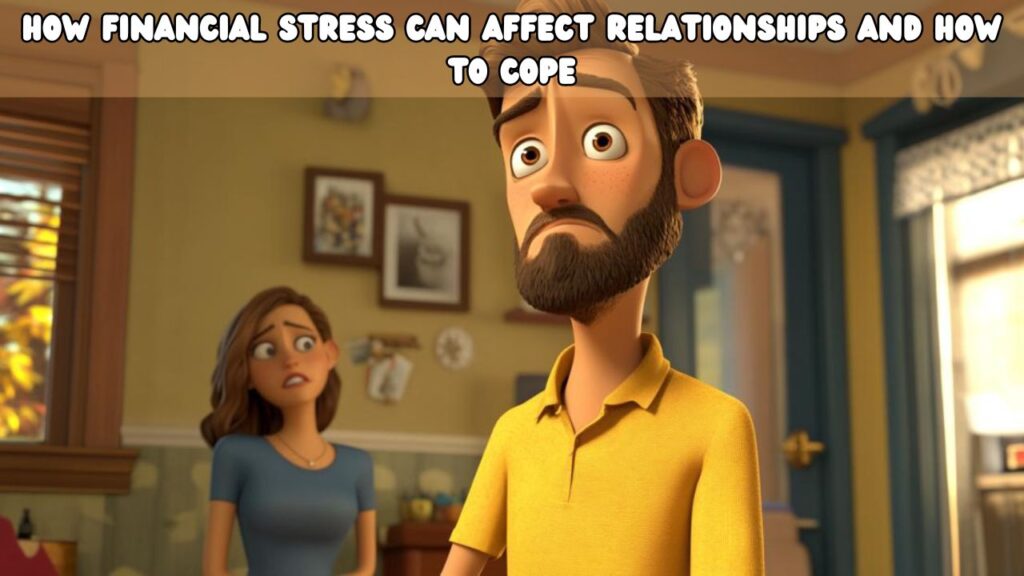Financial stress is an all-too-common challenge that many couples face at some point in their relationship. Whether it’s due to unexpected medical bills, job loss, mounting debt, or simply the pressures of day-to-day expenses, financial difficulties can create a strain that reverberates far beyond the bank account. When money becomes a source of tension, it often spills over into other aspects of the relationship, influencing emotional well-being, communication, and overall intimacy between partners. Financial stress doesn’t just impact your wallet—it affects your mental health, your connection with your partner, and your ability to enjoy life together.
Statistics and Relevance
The prevalence of financial stress in relationships is well-documented. According to a 2022 survey by the American Psychological Association, 64% of adults report that money is a significant source of stress in their lives, with many citing financial concerns as a major contributor to relationship difficulties. Additionally, a study conducted by SunTrust Bank found that finances are the leading cause of stress in relationships, with 35% of respondents identifying money as the primary issue they argue about with their partner. These statistics underscore the importance of addressing financial stress in the context of a relationship, as unresolved financial tension can lead to a range of negative outcomes, including increased conflict, emotional distance, and in some cases, even separation or divorce.
Purpose of the Article
Given the profound impact that financial stress can have on a relationship, it’s crucial to understand both the dynamics at play and the strategies available to manage this stress effectively. The purpose of this article is to explore the ways in which financial stress can affect a relationship, from communication breakdowns to intimacy issues, and to offer practical coping strategies that couples can implement to navigate these challenges together. By recognizing the signs of financial stress and taking proactive steps to address them, couples can not only alleviate some of the strain but also strengthen their bond and resilience in the face of adversity.
The Emotional Toll of Financial Stress on Relationships

Financial stress can have a profound impact on the emotional well-being of both individuals in a relationship, often setting off a cascade of negative emotions that affect the dynamics between partners. This section will explore three key ways in which financial stress can take an emotional toll: increased anxiety and depression, erosion of trust and security, and its impact on self-esteem and identity.
Increased Anxiety and Depression
One of the most immediate emotional responses to financial stress is an increase in anxiety. The uncertainty about whether bills will be paid, whether there will be enough money for basic needs, or how long the financial difficulties will last can create a pervasive sense of dread. This constant worry can lead to chronic stress, which may manifest as physical symptoms like headaches, sleep disturbances, and fatigue. Over time, the persistent anxiety can also contribute to the development of depressive symptoms.
In relationships, when one or both partners are experiencing anxiety or depression due to financial stress, it can become difficult to maintain emotional connection and support. The individual struggling with these feelings may withdraw, becoming less communicative and emotionally available. This withdrawal can create a vicious cycle—financial stress leads to anxiety and depression, which then leads to further strain in the relationship, exacerbating the financial stress and deepening the emotional turmoil. Without proper support and intervention, this cycle can become entrenched, making it harder for the couple to navigate their financial challenges together.
Erosion of Trust and Security
Trust and a sense of security are fundamental components of a healthy relationship. However, financial stress can erode these essential elements. For example, if one partner is responsible for managing the finances and fails to do so effectively—perhaps due to overspending, hidden debts, or poor financial planning—the other partner may begin to lose trust in their ability to handle money responsibly. This loss of trust can extend beyond finances, seeping into other areas of the relationship and leading to feelings of insecurity.
Even in situations where both partners are fully aware of and involved in the financial situation, the stress of managing limited resources can still undermine the sense of security that is critical to a stable relationship. Couples may start to feel less confident about their future together, questioning whether they will be able to achieve their shared goals, such as buying a home, raising children, or enjoying a comfortable retirement. This uncertainty can cause partners to become more guarded and less open, which further strains the relationship.
Impact on Self-Esteem and Identity
Financial difficulties can also take a significant toll on an individual’s self-esteem and sense of identity. In many cultures, financial success is often closely tied to one’s sense of self-worth. When someone is unable to meet their financial obligations or achieve their financial goals, they may start to feel like a failure, which can deeply affect their self-esteem. This is especially true if the person feels responsible for the financial difficulties or if they are unable to provide for their family in the way they believe they should.
Low self-esteem can influence how individuals relate to their partner. For instance, they may become more defensive, irritable, or withdrawn, fearing judgment or rejection. This change in behavior can alter the relationship dynamic, making it more difficult for partners to connect and support each other. Additionally, financial stress can challenge a person’s identity, particularly if their financial struggles force them to reconsider their career, lifestyle, or long-term plans. This identity crisis can create further emotional distance between partners, as one or both individuals grapple with feelings of inadequacy or uncertainty about who they are and what they want from life.
In sum, the emotional toll of financial stress on relationships is significant and multifaceted. It can heighten anxiety and depression, erode trust and security, and damage self-esteem and identity, all of which can profoundly affect the health and stability of a relationship. Understanding these emotional impacts is a critical step in addressing financial stress and finding ways to cope together as a couple.
Communication Breakdown During Financial Struggles

Communication is the lifeblood of any healthy relationship, but financial stress can severely disrupt this vital connection. When couples face financial difficulties, the strain often leads to communication breakdowns that exacerbate the problem, making it harder to find solutions and maintain a strong partnership. This section will explore three common ways in which financial stress can undermine communication: avoidance and withdrawal, frequent conflicts and arguments, and the emergence of blame and resentment.
Avoidance and Withdrawal
One of the most common reactions to financial stress is avoidance. Money is often a difficult and sensitive topic to discuss, especially when it’s associated with stress and uncertainty. When faced with financial challenges, one or both partners might start avoiding conversations about money altogether. This avoidance can take many forms: dodging discussions about bills, not disclosing spending habits, or refusing to engage in conversations about budgeting and future financial plans.
Over time, this avoidance can lead to emotional withdrawal. A partner who feels overwhelmed by financial stress might retreat into themselves, becoming less communicative and emotionally distant. This withdrawal is often a protective mechanism, a way to shield themselves from the anxiety and pressure associated with financial problems. However, it also creates a barrier between partners, making it difficult to work together to solve the issues at hand. When communication breaks down in this way, the couple loses one of their most important tools for navigating financial difficulties as a team.
Frequent Conflicts and Arguments
While some couples may avoid discussing financial problems, others might find that financial stress leads to more frequent conflicts and arguments. Money is one of the most common sources of conflict in relationships, and when financial stress is present, these conflicts can become more intense and frequent. Disagreements about spending habits, differences in financial priorities, or frustration over unmet financial expectations can easily spiral into arguments.
What’s particularly challenging about these conflicts is that they often extend beyond money. Financial stress can amplify underlying tensions or unresolved issues in the relationship. For example, a disagreement about spending could quickly escalate into a larger argument about feeling unappreciated or unsupported. This can create a negative feedback loop where financial stress leads to arguments, which in turn increase the emotional strain on the relationship, leading to even more financial stress.
In these moments, the ability to communicate effectively is crucial, but under the weight of financial pressure, many couples find it difficult to have productive conversations. Instead, they might resort to yelling, passive-aggressive comments, or other unhelpful communication patterns that only serve to deepen the divide between them.
Blame and Resentment
As financial stress intensifies, it’s not uncommon for partners to start blaming each other for their situation. Blame can arise for a variety of reasons—perhaps one partner feels the other isn’t contributing enough financially, or they may believe that their partner’s spending habits are irresponsible. Whatever the reason, assigning blame can be incredibly damaging to a relationship.
Blame often leads to resentment. The partner who is blamed may feel unjustly criticized, leading to feelings of anger and hurt. On the other hand, the partner doing the blaming might feel justified in their criticism, leading to a growing sense of bitterness. This resentment can fester over time, creating a toxic atmosphere in the relationship where neither partner feels valued or understood.
When blame and resentment take root, they can be very difficult to overcome. These feelings create emotional distance, making it even harder to communicate openly and work together to resolve financial issues. Instead of focusing on finding solutions, the couple becomes mired in a cycle of negativity and conflict, which only deepens their financial and emotional woes.
In summary, financial stress can lead to significant communication breakdowns in relationships. Avoidance and withdrawal, frequent conflicts and arguments, and the emergence of blame and resentment are common patterns that can emerge under financial pressure. Recognizing these patterns is the first step in addressing them and working towards better communication, which is essential for overcoming financial challenges as a couple.
The Role of Financial Stress in Intimacy and Connection

Financial stress doesn’t just affect the practical aspects of a relationship; it also deeply impacts the emotional and physical bonds that keep a couple connected. Intimacy, both physical and emotional, often suffers under the weight of financial pressures, leading to a sense of disconnection that can be hard to overcome. This section will delve into three key areas where financial stress can undermine intimacy and connection: decreased physical intimacy, emotional disconnection, and the loss of shared experiences.
Decreased Physical Intimacy
Physical intimacy is a vital part of many romantic relationships, serving as a way to express love, affection, and connection. However, financial stress can severely dampen this aspect of a relationship. The anxiety and tension that come with financial difficulties can lead to decreased libido, making partners less interested in or available for sexual intimacy. Stress hormones like cortisol can interfere with sexual desire and performance, making physical closeness feel like an additional burden rather than a source of comfort.
Moreover, when couples are preoccupied with financial worries, they may find it difficult to relax and be present with one another in a way that fosters intimacy. For instance, a partner who is constantly thinking about how to pay the next bill or where to cut costs might find it hard to switch off those concerns and engage in physical affection. This can lead to a decline in sexual activity, which can, in turn, create feelings of rejection or inadequacy if one partner desires more physical closeness than the other.
The lack of physical intimacy can also create a vicious cycle. As physical connection diminishes, partners might feel more distant from one another, leading to even more stress and strain on the relationship. Without the bonding effects of physical touch and affection, couples might find it harder to navigate their financial challenges together, further weakening their relationship.
Emotional Disconnection
Financial stress can also lead to emotional disconnection, which is often just as damaging as the loss of physical intimacy. When financial problems persist, they can create a cloud of negativity that hovers over the relationship. This ongoing stress can make it difficult for partners to be emotionally available to each other, as their mental and emotional energy is consumed by financial worries.
Emotional disconnection might manifest in several ways. Partners might stop sharing their thoughts and feelings with each other, leading to a breakdown in emotional intimacy. Conversations might become purely transactional, focusing only on logistics and financial issues rather than personal or relational topics. Over time, this lack of emotional engagement can create a deep sense of loneliness within the relationship, even if the partners are physically present with each other.
Furthermore, financial stress can cause individuals to become more irritable or short-tempered, leading to misunderstandings and hurt feelings. When one or both partners are emotionally distant, it becomes harder to offer or receive the support needed during tough times, leading to a further erosion of the emotional bond between them.
Loss of Shared Experiences
Shared experiences are a key way that couples build and maintain their connection. Whether it’s going out for a meal, taking a vacation, or even just enjoying a night out together, these activities provide opportunities for bonding and creating positive memories. However, financial constraints often limit a couple’s ability to engage in these kinds of experiences, leading to a sense of loss and disconnection.
When finances are tight, couples might cut back on the activities they once enjoyed together. Date nights, weekend getaways, and other forms of entertainment might become rare or nonexistent as the focus shifts to saving money and managing expenses. While these sacrifices are often necessary, they can also contribute to a feeling of monotony and dissatisfaction in the relationship.
Without these shared experiences, couples might struggle to find new ways to connect and keep the relationship vibrant. The loss of these bonding opportunities can make the relationship feel more like a series of obligations rather than a source of joy and fulfillment. Over time, this can lead to feelings of resentment or boredom, further straining the relationship.
In conclusion, financial stress plays a significant role in diminishing both physical and emotional intimacy, as well as limiting the shared experiences that help couples stay connected. Recognizing these effects is crucial for couples who are trying to navigate financial difficulties without losing their connection to each other. By being aware of the ways that financial stress can impact intimacy and actively working to counteract these effects, couples can help preserve their relationship during challenging times.
Coping Strategies for Couples Facing Financial Stress

While financial stress can create significant challenges in a relationship, it’s important to remember that there are effective ways to cope with these difficulties together. By addressing financial issues proactively and as a team, couples can mitigate the negative impacts on their relationship and even strengthen their bond. This section will explore three key coping strategies: engaging in open and honest communication, joint financial planning, and seeking professional help when needed.
Open and Honest Communication
One of the most important strategies for coping with financial stress is open and honest communication. Financial problems can create a lot of fear and anxiety, and these emotions often become even more difficult to manage when they are kept bottled up. Encouraging open discussions about finances can help to relieve some of this tension and ensure that both partners are on the same page.
Open communication involves more than just talking about the numbers. It’s also about sharing feelings, fears, and concerns related to the financial situation. For example, one partner might feel embarrassed or guilty about a debt they’ve accrued, while the other might be worried about how they will afford future expenses. By discussing these emotions openly, couples can foster a deeper understanding of each other’s perspectives and work together to find solutions.
It’s also crucial for these conversations to be regular and ongoing. Instead of waiting for a crisis to force a discussion, couples should schedule regular check-ins where they talk about their finances, review their budget, and discuss any upcoming expenses or financial goals. This not only keeps both partners informed but also helps to prevent misunderstandings and conflicts from arising.
Approaching these conversations with empathy and without judgment is key. Financial stress can easily lead to defensiveness or blame, so it’s important to create a safe space where both partners feel comfortable expressing their thoughts and emotions. This approach can help build trust and cooperation, making it easier to navigate financial challenges together.
Joint Financial Planning
Another effective strategy for managing financial stress as a couple is joint financial planning. Financial difficulties often feel more overwhelming when faced alone, but when couples approach their finances as a team, they can divide the burden and work together towards common goals.
Joint financial planning starts with creating a budget. This involves tracking income and expenses to get a clear picture of where the money is going. By doing this together, both partners can have a say in how money is allocated, which can help to prevent conflicts over spending and ensure that both partners are aligned in their financial priorities.
Setting financial goals is another crucial part of this process. These goals might include paying off debt, saving for a major purchase, or building an emergency fund. By setting goals together, couples can create a sense of shared purpose and motivation. It’s important that these goals are realistic and attainable; setting the bar too high can lead to frustration, while setting it too low might not provide the necessary motivation.
Joint financial planning also involves regularly reviewing and adjusting the budget and goals as needed. Life is unpredictable, and financial situations can change quickly. By staying flexible and revisiting the plan regularly, couples can adapt to new circumstances and continue making progress towards their goals.
Taking a team approach to financial planning not only helps to alleviate the practical aspects of financial stress but also reinforces the partnership. When both partners are actively involved in managing the finances, it can create a stronger sense of unity and shared responsibility.
Seeking Professional Help
Sometimes, despite their best efforts, couples might find that they’re unable to manage financial stress on their own. In these situations, seeking professional help can be a crucial step towards resolving financial issues and protecting the relationship.
One option is to consult a financial advisor or planner. These professionals can provide objective advice on budgeting, debt management, savings strategies, and long-term financial planning. A financial advisor can help couples create a realistic plan that takes into account their specific situation, providing a roadmap for improving their financial health. This can be especially helpful if the couple is facing complex financial challenges, such as significant debt or planning for retirement.
In addition to financial advice, couples may also benefit from relationship counseling or therapy, particularly if financial stress is causing significant strain on their relationship. A therapist can help couples improve their communication skills, address underlying emotional issues, and develop healthier ways of dealing with stress. Therapy can provide a safe space for partners to express their concerns and frustrations, helping to prevent financial stress from damaging the relationship further.
For some couples, combining financial counseling with relationship therapy can be the most effective approach. By addressing both the financial and emotional aspects of their stress, couples can work towards a more holistic solution that strengthens both their financial situation and their relationship.
In summary, coping with financial stress requires a proactive and collaborative approach. Open and honest communication, joint financial planning, and seeking professional help when needed are all essential strategies that can help couples manage financial challenges and maintain a healthy, supportive relationship. By working together, couples can not only overcome financial difficulties but also emerge from them with a stronger and more resilient partnership.
Strengthening the Relationship Despite Financial Stress

Financial stress can place immense pressure on a relationship, but it doesn’t have to weaken the bond between partners. In fact, with the right approach, couples can use these challenges as an opportunity to strengthen their relationship. By practicing empathy, offering emotional support, and celebrating small victories together, couples can reinforce their connection and resilience, even in the face of financial difficulties. This section will explore these strategies in detail.
Practicing Empathy and Understanding
One of the most crucial elements in maintaining a strong relationship during times of financial stress is empathy. When money is tight and tensions are high, it’s easy to become focused on one’s own worries and frustrations. However, it’s important to remember that both partners are likely feeling the strain, even if they express it differently. Practicing empathy means making a conscious effort to understand and share in each other’s emotions, especially when it comes to financial anxieties.
Empathy involves listening to your partner without judgment and acknowledging their feelings, even if they differ from your own. For example, one partner might be more anxious about long-term financial stability, while the other is more concerned with immediate expenses. Instead of dismissing these concerns or arguing about which is more important, empathy allows partners to validate each other’s feelings and recognize that both perspectives are valid.
Empathy also requires patience and compassion. Financial stress can make people more irritable, short-tempered, or prone to misunderstandings. By approaching each interaction with patience and a willingness to see things from your partner’s point of view, you can help to defuse tension and foster a more supportive atmosphere.
Understanding each other’s financial anxieties also means recognizing the different ways people cope with stress. For example, some may prefer to confront problems head-on, while others might need time to process their emotions before discussing solutions. Respecting these differences and finding a middle ground that works for both partners is key to maintaining harmony and understanding in the relationship.
Fostering Emotional Support
Emotional support is the bedrock of a strong relationship, particularly during tough times. When facing financial stress, it’s essential for partners to remind each other that they’re in this together. This sense of partnership can provide a much-needed source of comfort and strength, helping both individuals feel less alone in their struggles.
One way to offer emotional support is through regular check-ins. Make it a habit to ask your partner how they’re feeling about the financial situation and whether there’s anything specific they need support with. These conversations don’t always have to be about finding solutions; sometimes, simply listening and acknowledging each other’s emotions can be incredibly reassuring.
Offering reassurance is another important aspect of emotional support. Remind your partner that financial stress is a temporary challenge and that, as a team, you can overcome it together. Simple gestures, like a hug or a kind word, can go a long way in providing comfort and reinforcing your bond during difficult times.
It’s also important to share the emotional load. Financial stress can be exhausting, both mentally and emotionally. By supporting each other, you can prevent one partner from feeling overwhelmed or isolated in their struggles. This might involve taking turns managing certain aspects of the finances, or simply being there for each other when the stress becomes too much to bear.
Finally, emotional support includes celebrating each other’s efforts, even when the results aren’t immediately visible. Acknowledging the hard work and sacrifices both partners are making can boost morale and reinforce the idea that you’re working together towards a common goal.
Celebrating Small Wins Together
In the midst of financial stress, it’s easy to become fixated on what’s going wrong and overlook the progress you’re making. However, celebrating small wins—whether financial or personal—can be a powerful way to maintain positivity and strengthen your relationship.
Small wins might include paying off a debt, sticking to a budget for the month, or finding a creative way to save money. These achievements, no matter how modest, deserve recognition because they represent steps toward improving your financial situation. Celebrating these moments helps to build momentum and reinforces the idea that your efforts are paying off, even if the larger goals still seem distant.
Celebrating small wins doesn’t have to be extravagant. It could be as simple as cooking a special dinner at home, taking a walk together, or enjoying a movie night. The key is to make time to acknowledge and appreciate the progress you’re making as a team. This not only provides a morale boost but also creates positive memories that can help to counterbalance the stress you’re facing.
In addition to financial milestones, it’s also important to celebrate personal achievements. Perhaps one partner landed a new job, completed a project at work, or simply managed to stay positive during a particularly stressful week. Recognizing and celebrating these personal victories reinforces the idea that you’re both contributing to the relationship’s well-being, not just financially but emotionally and personally as well.
These celebrations, no matter how small, can help to maintain a sense of hope and connection during tough times. They remind both partners that progress is being made and that they have the strength to continue working towards their goals together.
In summary, strengthening a relationship during financial stress requires empathy, emotional support, and celebrating small victories. By practicing these strategies, couples can not only navigate their financial challenges more effectively but also build a deeper, more resilient connection that can withstand future stresses. Ultimately, facing financial stress together can be an opportunity to grow closer and emerge as a stronger, more united team.
Conclusion

Financial stress is a formidable challenge that can deeply impact the foundation of any relationship. Throughout this article, we’ve explored how financial difficulties can lead to increased anxiety and depression, erode trust and security, and affect self-esteem and identity. We’ve also seen how these stresses can break down communication, leading to avoidance, frequent conflicts, and the emergence of blame and resentment. The strain on intimacy and connection, whether through diminished physical closeness, emotional disconnection, or the loss of shared experiences, can further weaken the bond between partners.
However, it’s important to remember that while financial stress can pose significant challenges, there are effective strategies that couples can employ to manage these difficulties and even strengthen their relationship. Open and honest communication is essential for navigating financial challenges together, while joint financial planning ensures that both partners are aligned in their approach to managing money. Seeking professional help, whether from a financial advisor or a relationship therapist, can provide the necessary guidance and support to overcome financial hurdles.
In addition to these practical strategies, we’ve highlighted the importance of strengthening the relationship itself during times of financial stress. Practicing empathy and understanding, fostering emotional support, and celebrating small wins together are crucial for maintaining a positive and resilient connection. These strategies not only help to alleviate the immediate pressures of financial stress but also reinforce the emotional bond that sustains the relationship.
Encouragement for Readers
Financial stress is undeniably challenging, but it’s also a common experience that many couples face at some point in their relationship. The good news is that with the right approach, it’s possible to manage these challenges and even come out stronger on the other side. By recognizing the impact of financial stress on your relationship and taking proactive steps to address it, you can mitigate its negative effects and protect the bond you share with your partner.
Remember, it’s normal to feel overwhelmed or uncertain when dealing with financial difficulties. What’s important is how you choose to respond to these challenges. By staying committed to each other and working together as a team, you can navigate financial stress with resilience and confidence. It’s not about having all the answers right away, but rather about taking small, consistent steps towards improving your financial situation and maintaining a healthy, supportive relationship.
Call to Action
As you reflect on your own relationship, consider how financial stress might be affecting you and your partner. Are there areas where communication could be improved? Could you benefit from setting aside time for joint financial planning or seeking professional advice? Take a moment to think about the strategies discussed in this article and how they might be applied to your own situation.
If you’re feeling overwhelmed or unsure about where to start, don’t hesitate to reach out for help. Whether it’s scheduling a session with a financial advisor to get your finances in order, or seeking counseling to strengthen your relationship, there are resources available to support you. Remember, you don’t have to face financial stress alone—there are tools and professionals who can help you and your partner work through these challenges together.
Finally, consider the small wins you’ve already achieved, no matter how modest they might seem. Celebrate these victories with your partner and use them as motivation to keep moving forward. Each step you take, no matter how small, brings you closer to financial stability and a stronger, more connected relationship.
Facing financial stress can be daunting, but with determination, empathy, and a collaborative approach, you can overcome these challenges and build a relationship that’s not only resilient but also deeply fulfilling.
Dr. Seraphina Hart, PhD, is a relationship therapist with over two decades of experience in the field of psychology and human behavior. With a rich academic background from Stanford University, she has an in-depth understanding of the complexities of interpersonal relationships. Dr. Hart's journey began with a deep fascination with the human mind and how it forms emotional connections, leading her to specialize in relationship therapy.
Her compassionate approach and unique methodology are informed by her extensive study of various therapeutic modalities, including Cognitive Behavioral Therapy (CBT), Emotionally Focused Therapy (EFT), and mindfulness techniques. Dr. Hart believes in the power of empathy and understanding in healing and transforming relationships. With her guidance, clients learn to navigate their emotions, communicate effectively, and foster a deep sense of self-awareness.
- Dr. Harthttps://loveinteract.com/author/drhart/
- Dr. Harthttps://loveinteract.com/author/drhart/
- Dr. Harthttps://loveinteract.com/author/drhart/
- Dr. Harthttps://loveinteract.com/author/drhart/



You may like
Balancing Career and Relationship Goals: A Guide to Harmonious Living
The Impact of Childhood Experiences on Adult Relationships
Setting Boundaries in Romantic Relationships: A Path to Healthy Love